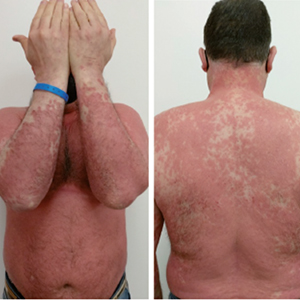Erythrodermic psoriasis improved by tildrakizumab

All claims expressed in this article are solely those of the authors and do not necessarily represent those of their affiliated organizations, or those of the publisher, the editors and the reviewers. Any product that may be evaluated in this article or claim that may be made by its manufacturer is not guaranteed or endorsed by the publisher.
Authors
Erythrodermic psoriasis (EP), clinically defined as prominent erythema and scaling affecting almost the entire skin surface, is a severe form and a rare variant of psoriasis. The treatment may require hospital admission with monitoring of vital signs and use of immunosuppressive drugs. Newer biological drugs, including anti-TNF, anti-IL-17, and anti-IL-23 agents, even if not specifically developed for the treatment of erythrodermic psoriasis, have been used successfully in single cases or small case series. Tildrakizumab is an IgG1ҡ monoclonal antibody that selectively binds to the p19 subunit thus inhibiting the interaction of interleukin 23 (IL-23) with its receptor and suppressing the release of IL-23-mediated proinflammatory cytokines. We present a case of EP in an obese man (Body mass index 35.2) who was successfully and safely treated with tildrakizumab.
How to Cite

This work is licensed under a Creative Commons Attribution-NonCommercial 4.0 International License.








